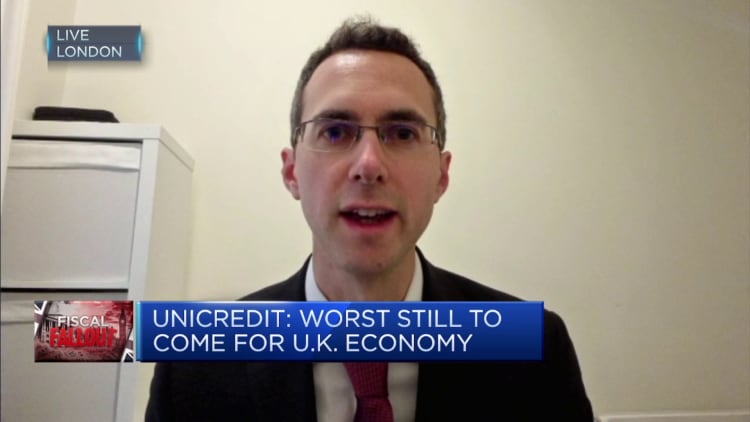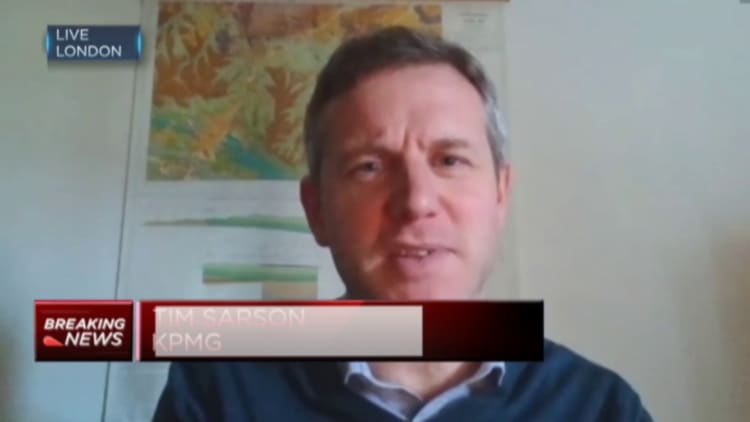[ad_1]
Britain’s Prime Minister Liz Truss holds a press conference in the Downing Street Briefing Room in central London on Oct. 14, 2022.
Daniel Leal | Afp | Getty Images
LONDON — Just six weeks into U.K. Prime Minister Liz Truss’ tenure and the political future of yet another Conservative leader looks to be in jeopardy.
Truss on Monday said she was sorry for mistakes made by her government and accepted responsibility for “going too far and too fast” with her contentious “trickle-down” economics approach.
The “trickle-down economics” theory is that tax breaks and benefits for the wealthy will eventually trickle down to everyone else. The approach has been sharply criticized by U.K. political opponents — and even U.S. President Joe Biden — at a time when Britain faces a deepening cost-of-living crisis.
The apology from Truss — whose “Trussonomics” policy stance has been likened to that of her political idols Ronald Reagan and Margaret Thatcher — followed one of the most extraordinary U-turns in modern British political history.
Newly installed Finance Minister Jeremy Hunt on Monday dramatically ripped up almost all the tax cuts Truss had promised, cut short her flagship energy policy and made clear there would be cuts in public spending to come — something Truss said she was “absolutely” not planning to do just last week.
The volte-face leaves Truss’ economic vision in tatters, with five of her own Conservative lawmakers now openly calling for her to resign.
Truss has insisted she will remain in post, telling the BBC that she intends to brush off criticism from across the political spectrum and lead the Conservatives into the next general election.
The U.K.’s new Finance Minister Jeremy Hunt made big fiscal announcements Monday.
House of Commons – PA Images / Contributor / Getty Images
Kallum Pickering, senior economist at Berenberg Bank, said in a research note that Hunt putting an end to “Trussonomics” meant it was now likely that Conservative lawmakers would replace the prime minister sooner rather than later.
“The scrapping of large parts of her policy manifesto suggests she is in power in name only,” Pickering said, noting it would not be a surprise if U.K. politics “turns noisy” in the coming days as the Truss government breaks down.
“We have been here before with previous PMs. Once the resignations start and the letters of confidence go into the party’s head committee, it is usually a matter of time before the PM resigns.”
Pickering said that in selecting Truss’ replacement, Conservative members of parliament would likely choose someone who has the confidence of financial markets.
This could include former Finance Minister Rishi Sunak, who lost to Truss in the recent leadership contest, or Hunt, “whose star seems to be rising as per his recent performance,” Pickering said.
Growth outlook ‘pretty bleak’
Hunt’s reversal of almost all the controversial tax measures announced by his predecessor Kwasi Kwarteng on Sept. 23 appeared to soothe investor concerns at the start of the week.
Sterling rose against the dollar on Monday, alongside government borrowing prices.
Truss and Kwarteng sought to turbocharge Britain’s sluggish economic growth with unfunded tax cuts forecast to total roughly £45 billion ($50.7 billion). The so-called “mini-budget” triggered chaos in financial markets, emergency intervention from the Bank of England and several humiliating U-turns.
Truss sacked Kwarteng last week amid mounting political pressure, although the fallout in markets continued until Hunt stepped in on Monday.

“The growth picture is pretty bleak,” Daniel Vernazza, chief international economist at Unicredit, told CNBC’s “Street Signs Europe” on Tuesday.
Hunt’s announcements were designed to restore market stability, Vernazza said, but did little to improve Britain’s growth outlook.
“We’ve got a big squeeze in real incomes and higher interest rates. The headwinds are numerous facing the U.K. economy over the next 12 months,” Vernazza said.
An orderly transition?
Opinion polls show just 10% of Britons view Truss favorably, according to a recent poll by market research firm YouGov, while support for the Conservative Party has collapsed.
For now, the ruling Conservatives still command a large parliamentary majority, and Truss, theoretically at least, has another two years before a national election must be held.
However, analysts at political risk consultancy Eurasia Group assign only a 10% possibility that Truss is able to hold on as prime minister.
“The consensus at Westminster is now that that the Prime Minister is so weak that she can do nothing without the assent of her Chancellor. She cannot afford to lose another one. Sacking her close ally Kwasi Kwarteng from the job has not stabilised her position in the way she had hoped,” the Eurasia Group analysts said.

“Given these pressures, Truss may even accept that she is not up to the job and inform Sir Graham Brady, the 1922 committee chairman, that she wants to leave with some dignity intact, with an orderly transition at a time convenient to the party,” they added.
“Although she has inevitably been shaken by events, allies insist she is determined to continue with her ‘mission,’ even though it is an open secret that Trussonomics has destroyed itself. But the odds may increase if things go from bad to worse.”
[ad_2]
